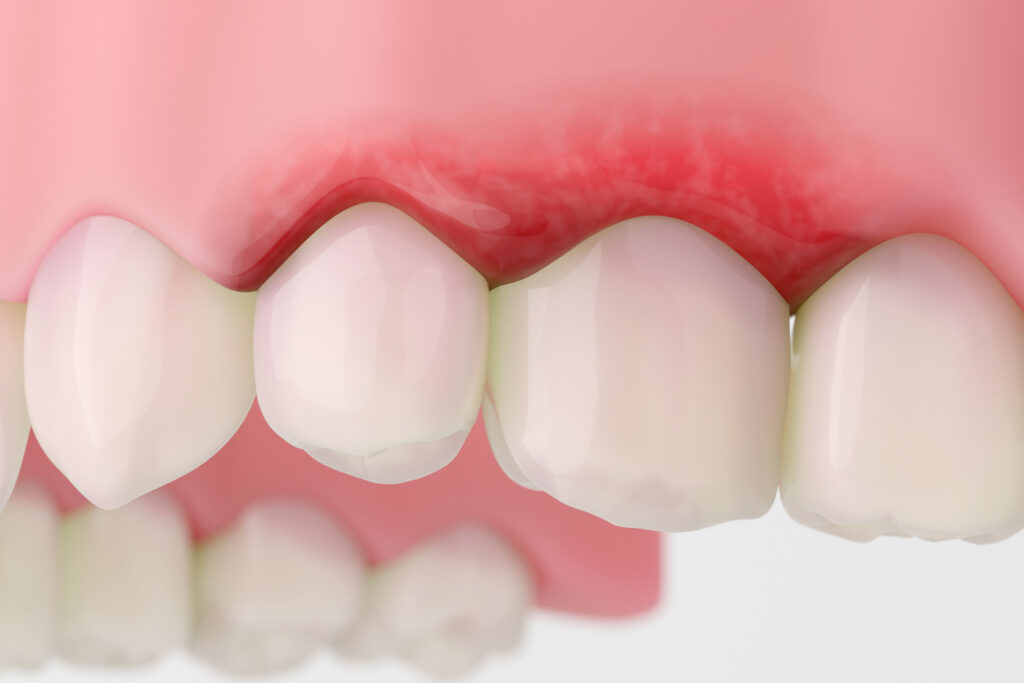When your gums begin to pull away from your teeth, exposing more of the tooth structure and sometimes even the root, you’re experiencing gum recession. This common dental problem affects nearly half of adults over age 30, often progressing so gradually that many don’t notice until symptoms become pronounced. Gum recession not only creates an uneven gumline that affects your smile’s appearance but also creates pockets between teeth and gums where harmful bacteria can accumulate, potentially leading to serious oral health issues if left untreated.
At Dental Specialties Northwest, we provide comprehensive care for patients experiencing gum recession throughout Seattle. Our team utilizes advanced techniques to address both the aesthetic concerns and health implications of receding gums. With our specialized approach to periodontal care, we can help restore your gumline and protect your oral health for years to come.
Risks Associated with Untreated Gum Recession
When gum recession is left untreated, it creates more than just aesthetic concerns. As your gums recede, they leave the tooth roots exposed, which can lead to several oral health complications.
Tooth sensitivity is often the first noticeable symptom of gum recession. The exposed root surface lacks the protective enamel layer found on the crown of your tooth, making it more susceptible to temperature changes and touch. You may experience sharp pain when consuming hot, cold, sweet, or acidic foods and beverages.
Additionally, tooth roots are more vulnerable to decay than the crowns of your teeth. Without the protection of your gums, roots are exposed to acids and bacteria in your mouth, increasing the risk of cavities in these areas. Root cavities typically progress faster than crown cavities and may require more extensive treatment.
Long-term Consequences of Progressive Recession
If gum recession continues without intervention, the supporting bone structure may begin to deteriorate. As bone loss occurs around a tooth, it becomes increasingly mobile and may eventually require extraction. This process can accelerate, affecting multiple teeth and potentially leading to significant tooth loss over time.
The pockets created by receding gums also harbor bacteria that are difficult to remove with regular brushing and flossing. These bacteria continue to damage the supporting structures of your teeth, creating a cycle of worsening recession and increasing pocket depths.
Treatment Options for Receding Gums
At Dental Specialties Northwest, we offer several approaches to treating gum recession, depending on the severity of your condition and underlying causes. For mild cases caught early, non-surgical interventions may be sufficient.
Professional deep cleaning procedures, including scaling and root planing, can remove plaque and tartar buildup from above and below the gumline. This treatment smooths rough spots on tooth roots where bacteria tend to gather, allowing the gum tissue to heal and reattach to the teeth. We may also recommend antimicrobial treatments to control bacterial growth during the healing process.
For moderate to severe recession, surgical interventions may provide the best results. Gum grafting procedures involve taking tissue from another area of your mouth (typically the palate) or using donor tissue to cover exposed root surfaces. This not only improves the appearance of your smile but also protects vulnerable root surfaces from further damage.
Other advanced treatments include guided tissue regeneration, which encourages your body to naturally regenerate bone and tissue lost to periodontal disease, and the pinhole surgical technique, a minimally invasive alternative to traditional gum grafting for certain cases.
Preventing Gum Recession
Prevention remains the most effective approach to managing gum recession. Maintaining excellent oral hygiene is fundamental—brush twice daily with a soft-bristled toothbrush using proper technique, and floss daily to remove plaque between teeth where your toothbrush cannot reach.
Regular dental check-ups and professional cleanings allow for early detection of gum problems before they progress to significant recession. During these visits, your dental team can identify areas of concern and provide guidance on improving your home care routine.
If you grind or clench your teeth, a custom nightguard may help prevent further damage to your gum tissue and teeth. Additionally, addressing other risk factors, such as tobacco use or misaligned teeth, can significantly reduce your risk of developing gum recession.
Contact Dental Specialties Northwest for Gum Recession Treatment
Addressing gum recession early is crucial for maintaining both the health and appearance of your smile. At Dental Specialties Northwest, our periodontal team offers comprehensive evaluations and personalized treatment plans to address your specific needs and concerns regarding gum recession.
Our practice combines advanced periodontal techniques with compassionate care to ensure comfortable, effective treatment for gum recession. If you’ve noticed changes in your gumline or are experiencing tooth sensitivity, don’t wait for the condition to worsen. Contact us today at (206) 682-8200 or through our contact form to schedule your periodontal evaluation.


